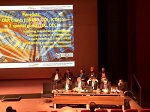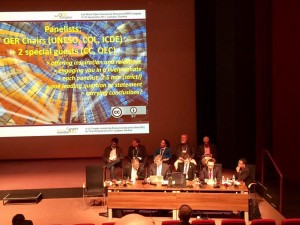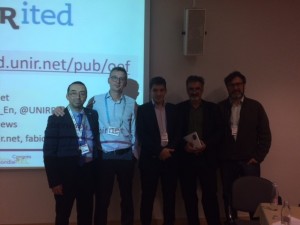Open Education NOW: From commitment to action. From action to accountability

In a bunch of a few months Open Education is becoming a remarkable movement. Not that it was not before, but that, on top of that, now it seems more visible. Teachers, content providers, instructional designers (and students, of course) come from the shades to the cover. In July, the II International Forum on ICT & Education gathered over 500 delegates in China; in early September, the 2nd OER World Congress registered over 600 delegates from 111 countries in Slovenia; in late September, the International Day of Universal Access to Education co-located with the 12th eLearning Africa met over 600 delegates from 100 countries in Mauritius; in mid-October, the 27th ICDE World Congress will call for over 1.000 people from over 100 countries in Canada; in mid-December, UNESCO MGIEP Tech India will probably reunite the same numbers in India; in March 2018, IEEE EduCon will target a similar target and metrics, in Spain; and so on. In less than 6 months, thousands of people and hundreds of country meet up around Open Education, Educational Technology and Innovative Education. Every major institutional player contributes actively to many of these events: Open Education Consortium, OER Foundation, International Council for Open and Distance Education, UNESCO, Creative Commons, Commonwealth of Learning, etc.

UNIR iTED (Research Institute for Innovation & Technology in Education), along with UNESCO Chair on eLearning and ICDE Chair in Open Educational Resources -all of them, at Universidad Internacional de La Rioja (UNIR)-, contributes pro-actively to many of these efforts for raising awareness amongst the stakeholders and to give visibility for an increasing wave in the educational community. We present, discuss and defend a number of stand points: from the diverse interpretation of openness to the need for an accreditation agreement for OER. And above all, we stand for two major issues. A practical one: UNIR has approved the first Open Education institutional declaration from an open university and a private university, Worldwide. And this means something about our social responsibility as university. UNIR is a private, for-profit university, which does not mean that it looks just for revenue, but that revenue is vital for survival and giving a good service. Whatever that UNIR does not charge it costs something. And right today, UNIR provides 25% of their educational resources for free: tv.unir.net, IJIMAI, Open repository Re-Unir, blogs… The OE declaration aims at up to 60% by 2020. We are determined for it.

The second major issue is conceptual. Out of this historical moment, with so many people working in good conscience to open up education, under the spirit of UN SDG 4, we need to be specific. We, the educational community, the Society, need to move from commitement to action (like the motto of the 2nd OER World Congress) but also from action to accountability. We need to be effective, to provide resources and services, but also to apply metrics and be smart. We need to move from a feeling of good-willlingness to a calculated projet-management based action plan. Milestones, resources committed, impact factors, key performance indicators, dissemination metrics, scalability and, above all, sustainability. A good conscience gets to sleep when a real problem comes to the table, or a family issue, or the lack of funding, or the increasing more often job multi-tasking scheme. So, we cannot guarantee a long-term action if there is not a business model and a strategic plan behind all those remarkable efforts. It is our duty not just being visionaries and good people, but also practical stakeholders of the educational game. We need to get into accountable actions, leaving behind promises in good-faith and embracing a well-equipped master plan in motion. This is the key for success to the matter. And, as educators, it is our duty.
Daniel Burgos
Dubai, September the 30th, 2017
